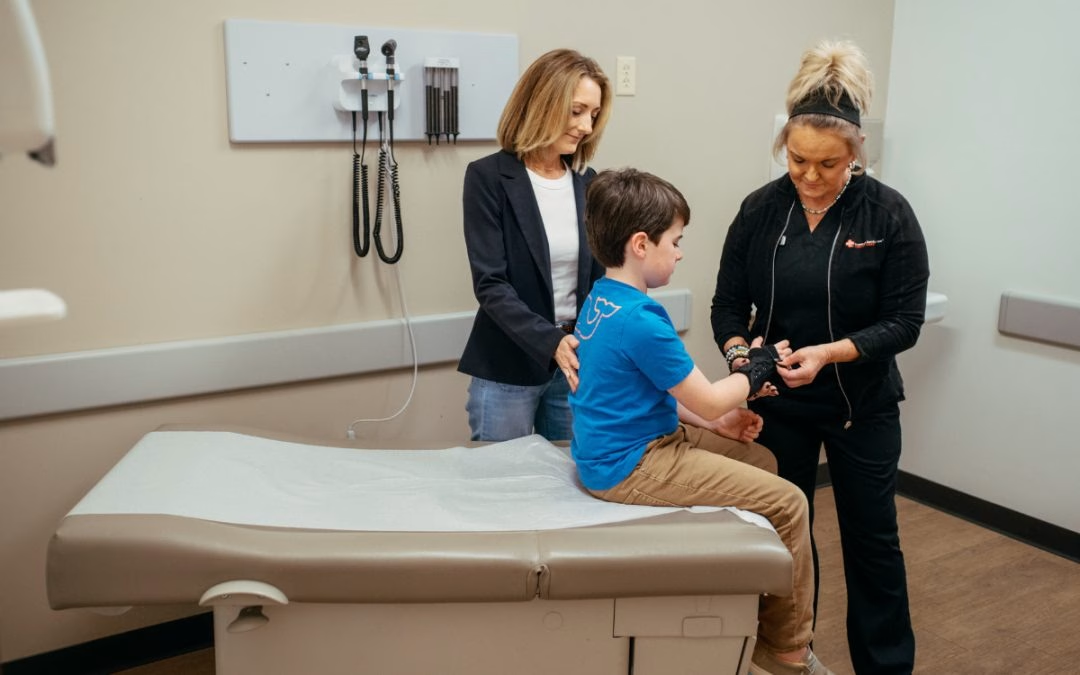
A quick stop at Turkey Creek can easily turn into an unexpected medical visit when your child develops a sudden fever or twists an ankle while playing outside. While urgent care provides a convenient solution for non-life-threatening health concerns, many children experience fear or anxiety when faced with unfamiliar medical environments. Whether it’s the fear of pain, separation, or simply not knowing what to expect, a visit to urgent care can feel overwhelming for a young child.
At AFC Knoxville, we understand that caring for a sick or injured child can be just as emotionally challenging for parents as it is for the child. Our team is committed to delivering timely, compassionate care while helping families navigate the emotional side of pediatric visits. With a little preparation, you can ease your child’s fears and help make the experience more comfortable for everyone involved.
Schedule a visit online today.
Why Children Fear Urgent Care
Fear of medical visits is common among children. In fact, research shows that medical anxiety can begin at a young age and often stems from:
- Fear of pain, such as shots or examinations
- Separation anxiety, especially in unfamiliar environments
- Previous negative experiences with healthcare providers
- General discomfort with new people or settings
Children rely on routine and predictability to feel safe. A sudden trip to urgent care can disrupt that sense of stability, especially when they are already not feeling well. Understanding the cause of their anxiety is the first step in helping them feel more secure.
How to Prepare Your Child for an Urgent Care Visit
Taking a few simple steps before arriving at urgent care can make a significant difference in how your child reacts to the visit. Here are some practical, research-supported strategies to prepare your child and reduce fear:
1. Use Clear, Calm Language
If possible, talk to your child beforehand about what will happen. Use simple, reassuring words to describe the visit. For example:
“We’re going to AFC so someone can help you feel better. I’ll be with you the whole time.”
Avoid making promises you can’t keep, like saying, “It won’t hurt,” as this can lead to broken trust if discomfort does occur. Stick with honest reassurance and focus on safety and support.
2. Emphasize the Helpers
Framing the visit in a positive light helps children feel less fearful. Explain that the people at the clinic are there to help them feel better. Try saying, “The nurse is very kind and will help your sore throat go away.” Positive associations with caregivers can go a long way in reducing anxiety.
3. Bring Something Familiar
A comfort item like a favorite stuffed animal, blanket, or small toy can make a big difference. Familiar objects provide a sense of security and can help distract your child during wait times or examinations.
4. Let Your Child Make Small Choices
Giving your child simple choices can restore a sense of control in an unfamiliar situation. Let them pick what to wear, what comfort item to bring, or what treat to enjoy afterward. These small decisions can boost confidence and reduce stress.
5. Stay Calm Yourself
Children are highly perceptive and take emotional cues from adults. Even if you’re feeling worried, try to remain calm and collected. A steady voice, relaxed body language, and encouraging words can help your child feel more secure.
Tips for a Smooth Visit
When your child isn’t feeling well, saving time and reducing stress is important. These practical tips can help streamline your urgent care visit:
- Check in online to reduce wait time. AFC Knoxville offers convenient online check-in options for a faster experience.
- Bring essentials like snacks, water, a tablet, headphones, or coloring supplies to keep your child occupied.
- Pack important documents including your child’s insurance card, current medications, and any relevant medical history.
Staying organized and prepared can help your visit go more smoothly and allow your child to remain as comfortable as possible.
Support After the Visit
Once the visit is over, reinforce your child’s courage and cooperation. Praise specific behaviors such as, “You were very brave when you talked about where it hurt,” or “I’m proud of how patient you were while we waited.” Positive reinforcement helps shape future responses to medical situations.
You might also consider following the visit with a comforting activity. A stop for frozen yogurt or a walk at Lakeshore Park can help your child associate the experience with safety and care rather than fear.
How AFC Knoxville Supports Families
Our team is trained to care for children with empathy and understanding. We recognize the unique needs of young patients and strive to create a welcoming, child-friendly environment. Our clinic offers:
- Walk-in availability for sudden injuries and illnesses
- Extended evening and weekend hours to suit your family’s schedule
- Short wait times with the option for online check-in
- Compassionate providers experienced in working with pediatric patients
- Clean, family-friendly facilities designed with comfort in mind
We are here to provide reliable care during life’s unpredictable moments, whether your child has a lingering cough or a playground injury.
A Comfortable Visit Starts with Preparation
When your child fears urgent care, a thoughtful approach can turn a scary experience into a manageable one. By preparing with calm communication, familiar comforts, and emotional support, you can help your child feel more secure and confident during their visit.
At AFC Knoxville, we’re committed to making pediatric urgent care as stress-free as possible. Whether it’s your first visit or a return trip, we’re here to support you with compassionate care you can trust.
Walk in or check in online today, and let us help your family feel better, faster.